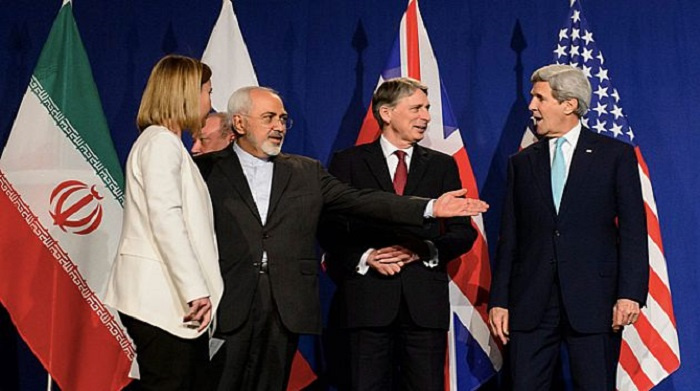JCPOA and the “Iran Containment” Doctrine

During the past two decades, US policy towards Iran was based on the “containment doctrine”. On this basis, the US has made attempts to prevent Iran’s regional and international influence and presence through close cooperation with its allies. But some war-seeking measures taken by the US, including the occupation of Iraq and Afghanistan during the neo-con administration, created a geopolitical atmosphere for Iran’s regional strategy and led to the failure of the policy of containment.
It seems that the policy of accusing Iran on the nuclear issue which started in 2003 was also aimed at controlling the consequences of the US’ direct military presence in the region; meaning that the necessities of continuing the doctrine of containment for the US forced them to pursue the scope of international pressures against Iran in new and more expansive dimensions.
The above-mentioned points indicate that the process of the new nuclear diplomacy of Iran and the P5+1 is formed on the basis of a collection of objectives and strategies by both parties. It must be said that even within the framework of Obama’s foreign policy doctrine, the US views the recent nuclear agreement with Iran as part of the pattern of containment of Iran’s power in the region.
Recent remarks made by Nicholas Burns, the former spokesman of the US State Department, in this regard are interesting to note. He believes that the recent nuclear negotiations must be considered as part of the Iran containment policy and stresses that, “The nuclear agreement is a small agreement compared with all the issues that are related to Iran. The nuclear agreement must be part of the more general and intelligent policy to contain Iran. In that case, this agreement could provide the US’ objectives in line with its national interests. We have had problems with Iran since 35 years ago. In 1979, Iran took our diplomats hostage. But Obama reached the conclusion that the US must only negotiate with Iran on the nuclear issue and I believe that this was the right decision. A framework was needed for negotiations about a special case and could not cover all issues.”
Similar statements have been repeated by US officials during recent days and weeks. That is why, in his meeting with the members of the Council of Experts, the Supreme Leader reiterated that, “The US has its own policies in the region. One of them is that the US administration must have complete dominance in Iraq and Syria and other countries … among their statements which make us sensitive is that they say that the JCPOA has created certain opportunities inside and outside of Iran and in the region for the US; this is what the US states. What I would like to say to our friends in the government is that you should not allow such opportunities to be established for them; you should also attempt to prevent such opportunities from being made for them outside the country. We have always stated that we would only negotiate about the nuclear issue. I have made this issue clear for the officials of the Foreign Ministry and others. The reason is that their view is totally against our views. We have 180 degrees difference on those issues.”
Now the question that is raised is, what will the impacts of the recent nuclear agreement and, specifically, the JCPOA which was reached between Iran and the P5+1 be on the US doctrine of containing Iran? In fact, the basis of this question is founded on the theory that, within the framework of the policy of “interaction and limited negotiation”, Iran attempts to break down the doctrine of containment against itself. Therefore, the process of reaching this objective is now the most important concern of experts and think-tanks.
In order to achieve this strategic objective, the two following fundamental points must be considered:
1-Iran must stress its policy of maintaining and developing its power of presence and influence in the region so that it would be considered as the axis of strategic balance. The important point in this regard is that the US’ Arab allies of the region have serious concerns about this matter and their criticisms of Obama are concentrated on this issue. But it seems that, while the US makes great efforts to remove these concerns, it is not ready to publicly talk about Iran’s regional power. In an interview with CNN, Obama has stated that, “The reason behind Iran’s influence in the region is not mainly related to the money that it spends. It is due to the fact that although the Arab states of the Persian Gulf spend eight times more than Iran’s defense budget, they do not use it in a path which would strategically be effective.”
2-Iran must have necessary concerns about following the pattern of nuclear diplomacy on regional issues so that the strategy of resistance and Iran’s independent regional policies would not be damaged. This point must carefully be considered that the Iran-P5+1 agreement has different effects and applications in the region and has led to the taking of different positions in political, security and military aspects. There is no doubt that the Ministry of Foreign Affairs must recognize the overt and covert dimensions of these positions and pursue new political initiatives to create new opportunities in the post-agreement era.

